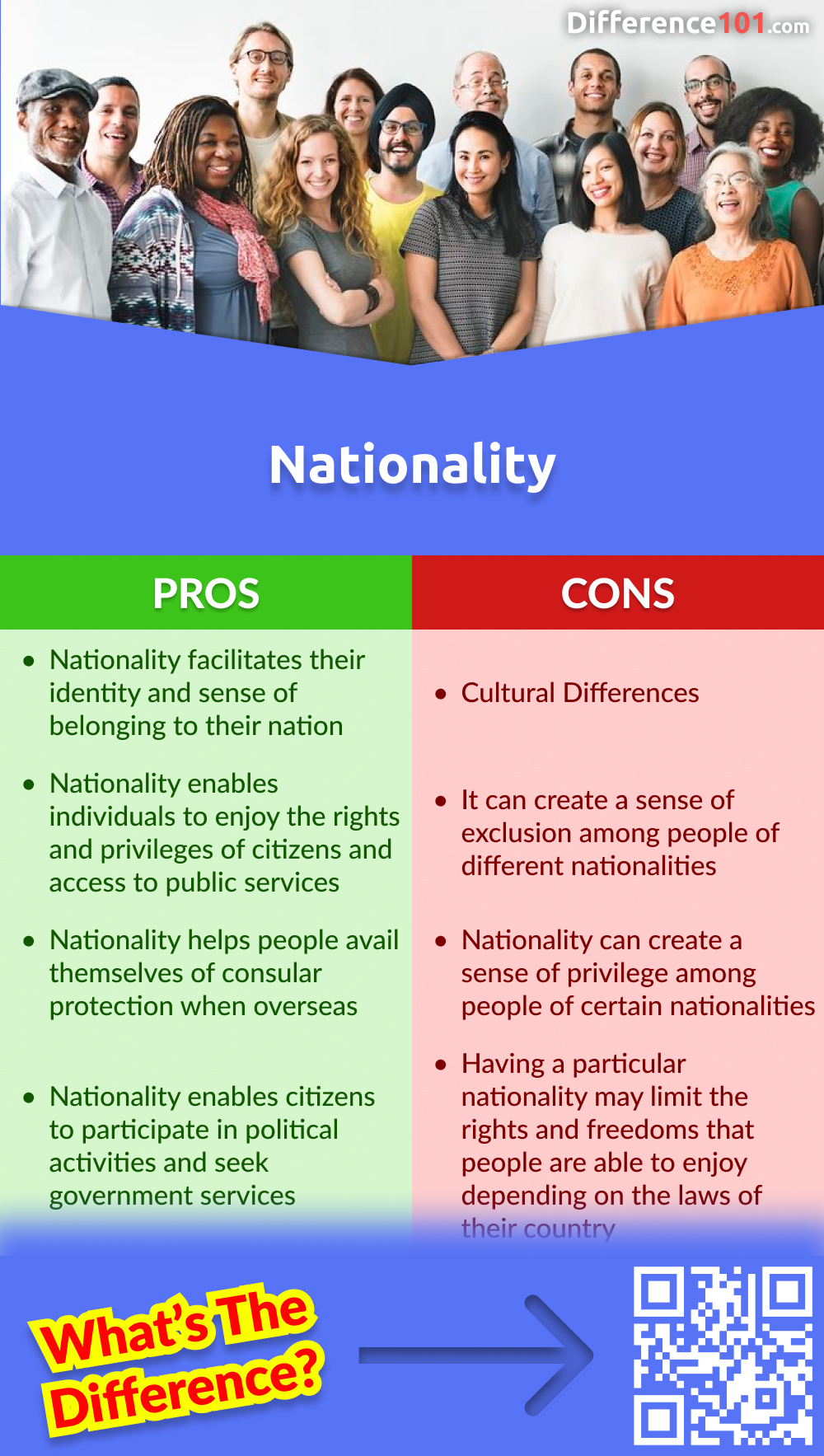When discussing multiculturalism and the impact of diversity on modern society, it is important to understand the differences between nationality and ethnicity. To the untrained eye, they may appear to be synonyms, but in reality they are two distinct concepts that should be understood correctly. Nationality and ethnicity are both essential components in understanding a person’s identity and how they interact with their environment. Both terms are related to identity and culture, yet they have distinct meanings. Nationality refers to the legal identity of a person based on their country of origin, while ethnicity is about a person’s cultural and social identity, often intertwined with their ancestral heritage. In this blog post, we will explore the differences between nationality and ethnicity, and how they shape our understanding of identity, culture, and society.
Table of Contents
What Is Nationality?

Nationality is the legal relationship between a person and a state. It is a legal bond that identifies an individual as belonging to a specific nation and is the basis of their legal rights and duties in that nation. Nationality determines the individual’s rights to protection by the state, including access to education, employment, healthcare, and other social services. It also determines the individual’s obligations to the nation, such as paying taxes and military service. Nationality is typically acquired either by birth or through a process of naturalization. It is important to note that the concept of nationality is distinct from that of citizenship, which is the legal status of belonging to a state.
What Is Ethnicity?

Ethnicity is a social construct based on shared cultural heritage and identity. It is often expressed through shared language, religion, values, beliefs, dress, and other cultural markers. Ethnicity can be a powerful source of social identity and community, with people feeling a sense of pride and connection to their ethnic group. However, it can also be a source of inequality and discrimination. For example, those from minority ethnic backgrounds may be subject to negative stereotypes, exclusion, and prejudice in society. Ultimately, ethnicity is a fluid concept that is continually changing and evolving.
Key Differences Between Nationality And Ethnicity
Nationality and ethnicity are two concepts that are often confused. Nationality is a legal status of a person, usually in regards to a specific country, and is typically acquired through birth or naturalization. This is often based on the state laws of a particular country. Ethnicity, on the other hand, is an internal marker of identity related to a person’s cultural heritage, language, religion, customs and traditions. It is primarily based on shared characteristics that define a particular social, racial, or cultural group. Nationality and ethnicity are two concepts that are closely related, yet remain distinct and separate from one another.
Key differences between nationality and ethnicity include the following:
- Nationality is a legal classification, while ethnicity is a social classification.
- Nationality is based on the laws of a particular country, while ethnicity is based on shared characteristics within a social group.
- Nationality is externally determined, while ethnicity is internally determined.
- Nationality: A nation is a group of people with a common ancestry, language, culture, and history. Ethnicity: A particular group of people who share common physical, cultural, or national characteristics.
Nationality vs. Ethnicity Similarities
The similarities between nationality and ethnicity include the fact that both generally involve a sense of connection to a group or community. Additionally, they both involve a sense of identity and culture, and are largely based on shared beliefs and values. Finally, both concepts are often inherited, and may be passed down through generations. Understanding the similarities between nationality and ethnicity is essential for recognizing the diverse cultural identities of individuals.
- Nationality and ethnicity generally involve a sense of connection to a group or community
- Nationality is a set of beliefs and values that determine someone’s identity and heritage
- Nationality is a set of beliefs and values
- Ethnicity – people of the same race that are united
- They both involve a sense of identity and culture, and are largely based on shared beliefs and values
Nationality vs. Ethnicity Pros and Cons
Nationality Pros & Cons

Nationality Pros
Nationality has numerous advantages for the citizens of any nation. Firstly, it facilitates their identity and sense of belonging to their nation. Furthermore, nationality enables individuals to enjoy the rights and privileges of citizens and access to public services. Additionally, it helps them to benefit from the laws of their country and avail themselves of consular protection when overseas. Moreover, nationality enables citizens to participate in political activities and seek government services. Finally, it provides them with economic opportunities, such as the ability to travel and work abroad. Therefore, nationality is a great benefit for the citizens of any country.
- Nationality facilitates their identity and sense of belonging to their nation
- Nationality enables individuals to enjoy the rights and privileges of citizens and access to public services
- Nationality helps people avail themselves of consular protection when overseas
- Nationality enables citizens to participate in political activities and seek government services
Nationality Cons
Nationality is a status that has both advantages and disadvantages. One of the main disadvantages of nationality is that it can create a sense of exclusion among people of different nationalities. This can lead to discrimination and other forms of prejudice. Additionally, nationality can create a sense of privilege among people of certain nationalities, which can lead to feelings of superiority over others. Additionally, having a particular nationality may limit the rights and freedoms that people are able to enjoy depending on the laws of their country. Furthermore, it is possible for nationality to be used as a tool for political gain, and this can lead to the exploitation of individuals. Finally, the concept of national identity can be incredibly divisive, leading to tensions and conflicts among people of different nationalities.
- Cultural Differences
- It can create a sense of exclusion among people of different nationalities
- Nationality can create a sense of privilege among people of certain nationalities
- Having a particular nationality may limit the rights and freedoms that people are able to enjoy depending on the laws of their country
Ethnicity Pros & Cons

Ethnicity Pros
The study of ethnicity can provide many advantages to both individuals and societies. On an individual level, understanding one’s own ethnic identity can provide a sense of belonging and connection to a larger community. In addition, individuals may benefit from understanding the different cultural norms and values of different ethnicities, which can help foster a more open-minded attitude towards other people. On a societal level, understanding different ethnicities can lead to more inclusive, cooperative, and equitable societies. It can also help to foster a better understanding of the experiences and perspectives of different groups, which can lead to a more unified and just society overall. Ultimately, understanding ethnicity can benefit both individuals and societies in a variety of ways, from providing a sense of identity to promoting a more inclusive and equitable society.
- According to a study, it was found that people with minority ethnic backgrounds are more likely to be intelligent
- Some people with minority ethnic backgrounds like to excel in certain sports: This shows how ethnicity can increase athletic ability
- People with ethnicity also like to excel in certain jobs
- Understanding one’s own ethnic identity can provide a sense of belonging and connection to a larger community
Ethnicity Cons
Ethnicity can shape how people view the world and the individuals around them. While diversity can be beneficial, the disadvantages of ethnicity can be significant. These include stereotypes, prejudice, and discrimination. Stereotypes are oversimplified ideas or assumptions about a group. Prejudice is an unjustified negative attitude towards an individual or group based on their ethnicity. Discrimination is an action based on prejudice, where certain individuals are treated differently or unfairly. Furthermore, ethnic conflict can arise when different groups struggle for power and resources. This can lead to social unrest and even violence. Finally, ethnic identity can lead to a feeling of isolation, as individuals may struggle to identify with the dominant culture. In conclusion, ethnicity can lead to both advantages and disadvantages, and it is therefore important to be aware of the potential pitfalls.
- Ethnic identity can lead to a feeling of isolation, as individuals may struggle to identify with the dominant culture.
- They are at the risk of suffering from discrimination
- Cultural differences
- Lack of understanding of each other
- Prejudice
- Stereotyping
Comparison Table: 5 Key Differences Between Nationality And Ethnicity
| Components | Nationality | Ethnicity |
|---|---|---|
| Definition | Nationality is a legal bond that identifies an individual as belonging to a specific nation and is the basis of their legal rights and duties in that nation | Ethnicity is a social construct based on shared cultural heritage and identity |
| Based on | Nationality is based on the laws of a particular country | Ethnicity is based on shared characteristics within a social group |
| Features | A nation is a group of people with a common ancestry, language, culture, and history | A particular group of people who share common physical, cultural, or national characteristics |
| Classification | Nationality is a legal classification | Ethnicity is a social classification |
| Defined by | Nationality is externally determined | Ethnicity is internally determined |
Comparison Chart

Comparison Video
Conclusion
In conclusion, nationality and ethnicity are two concepts that are often used interchangeably, but they each have distinct meanings. Nationality is defined by a person’s legal recognition as a citizen of a country, while ethnicity is related to a person’s shared cultural traditions and ancestry. Nationality is largely determined by a person’s birthplace, while ethnicity is more of a self-defined concept. Awareness of the differences between these two concepts can help us better understand the complexities of identity and the diversity of the world’s cultures.








